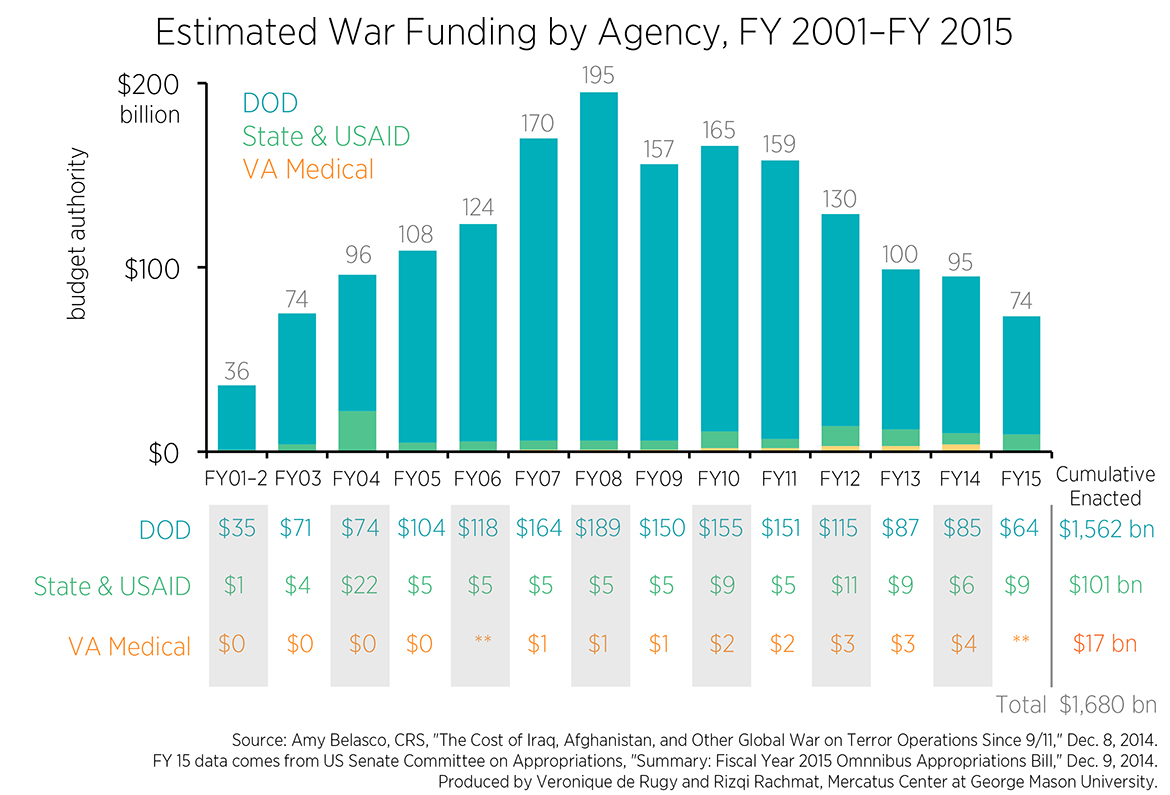- | Government Spending Government Spending
- | Data Visualizations Data Visualizations
- |
Wars in the Middle East Have Cost Taxpayers Almost $1.7 Trillion
When it comes to funding national defense, policymakers tend to ignore war costs so an accurate assessment on the burden on taxpayer of overseas military ventures is increasingly important as pressure mounts to increase the Pentagon’s regular “base” budget.
A recent report from the Congressional Research Service, which examines the cost of Iraq, Afghanistan, and other global “War on Terror” operations since 9/11, calculates a cumulative (fiscal year 2001 through fiscal year 2014) nominal price tag of $1.6 trillion. Adding the war funding for fiscal year 2015 that was passed in December pushes the total to almost $1.7 trillion. When it comes to funding national defense, policymakers tend to ignore war costs so an accurate assessment on the burden on taxpayer of overseas military ventures is increasingly important as pressure mounts to increase the Pentagon’s regular “base” budget.
As the following chart shows, the vast majority of the funding has been allocated to the Department of Defense ($1.562 trillion). The State Department and related foreign aid efforts received $101 billion and the Department of Veterans’ Affairs, $17 billion.
Looking at the cost of the post-9/11 wars is important because policymakers have a habit of citing the Pentagon’s base budget, which excludes war funding, when debating and discussing funding for national defense. But, as I discuss in a separate chart, using base Department of Defense figures severely understates the total cost to taxpayers for national defense. War funding, which is budgeted under the title “Overseas Contingency Operations” (OCO), is also exempt from the spending caps implemented by the Budget Control Act of 2011. Policymakers have been rightly criticized for evading the caps by designating funds as OCO that should arguably be in the Pentagon’s base budget.
With the Republicans now in complete control of Congress, there is growing speculation that the GOP will seek to bust the caps on defense funding. And the president’s upcoming Pentagon budget request is expected to propose the same. On top of the on-going fighting in Afghanistan, Iraq, and Syria, the recent high-profile attacks by ISIS and al-Qaeda affiliates in Europe are being cited by hawkish members of Congress as justification for additional funding. Before doing so, policymakers should consider whether our heavy military presence in the Middle East, and the $1.7 trillion allocated in war funding since 9/11, have created more problems than they have eliminated. Indeed, a strong case could be made that what taxpayers are actually paying for is national offense rather than national defense—and the former is driving the latter.


